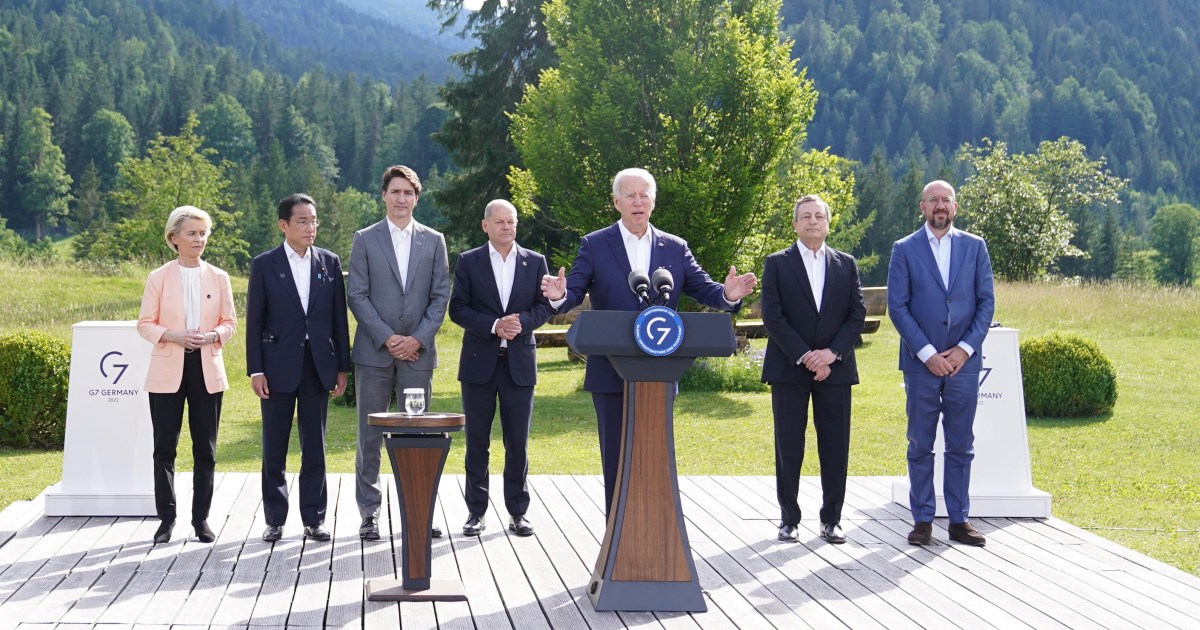US President Joe Biden called on his counterparts to "stand together" against Russia, during the Group of Seven summit, which began Sunday in the Bavarian Alps region in Germany, to discuss a number of issues, most notably the war in Ukraine and fears of a global food and energy crisis.
At the start of the 3-day summit in Elmau Castle, 4 countries from the Group of Seven major industrialized countries announced that they would ban imports of Russian gold, as part of efforts to tighten sanctions on Moscow and cut off funding for its war on Ukraine.
Biden said the group would announce a ban on Russian gold imports as part of the latest package of sanctions, but it was not clear if this step would be done in concert, as European Council President Charles Michel said the issue requires careful handling, otherwise it may backfire.
The United States, Britain, Canada and Japan agreed to ban Russian gold, and France only announced its support.
British Prime Minister Boris Johnson said: "The measures we announced today will directly target Russia's wealthy and powerful class and strike Putin's military machine to the core."
And the value of Russian gold exports last year amounted to about 15.5 billion dollars.
In the same context, a senior US administration official said that the Group of Seven summit will make a formal announcement on banning Russian gold imports on Tuesday, adding that it is "one of the main exports and a major source of income for Russia in terms of its ability to deal with the global financial system."
Russia bombs Kyiv
In conjunction with the start of the G7 summit, Russian forces bombed the center of the Ukrainian capital, Kyiv, for the first time in 3 weeks.
The Russian Defense Ministry said - in a statement - that it had bombed the "Artyom" missile factory in Kyiv, and explained that the damage to a neighboring apartment building was caused by a Ukrainian anti-aircraft missile, denying reports that it had bombed a residential area.
These developments come before another summit of the North Atlantic Treaty Organization (NATO) in the Spanish capital, Madrid, which is scheduled to start on Tuesday.
For his part, US President Joe Biden described the Russian bombings as "barbaric", while Ukrainian Foreign Minister Dmitro Kuleba said that the G7 should respond by providing more weapons to Kiev and imposing tougher sanctions on Moscow.
Imminent global crises
This year's G7 summit comes amid darker circumstances than last year, when these leaders met for the first time since the start of the COVID-19 pandemic.
The rise in global energy and food prices as a result of the Ukraine war has dampened economic growth, and the United Nations has warned of an "unprecedented global hunger crisis".
In this context, President Biden announced that the Group of Seven decided to invest $600 billion in global infrastructure.
For his part, German Chancellor Olaf Scholz said that all the leaders of the Group of Seven are concerned about an impending global economic crisis, with slowing growth and rising inflation.
"All member states are concerned about the crisis we are facing. The declining growth rates in some countries, rising inflation, shortages of raw materials and disruptions in supply chains, these are not simple challenges," Schultz added in a televised statement.
The leaders of the Group of Seven discuss options to confront rising energy prices and search for alternatives to Russian oil and gas imports, and they also discuss issues of climate change and the expansion of Chinese influence, among others.

